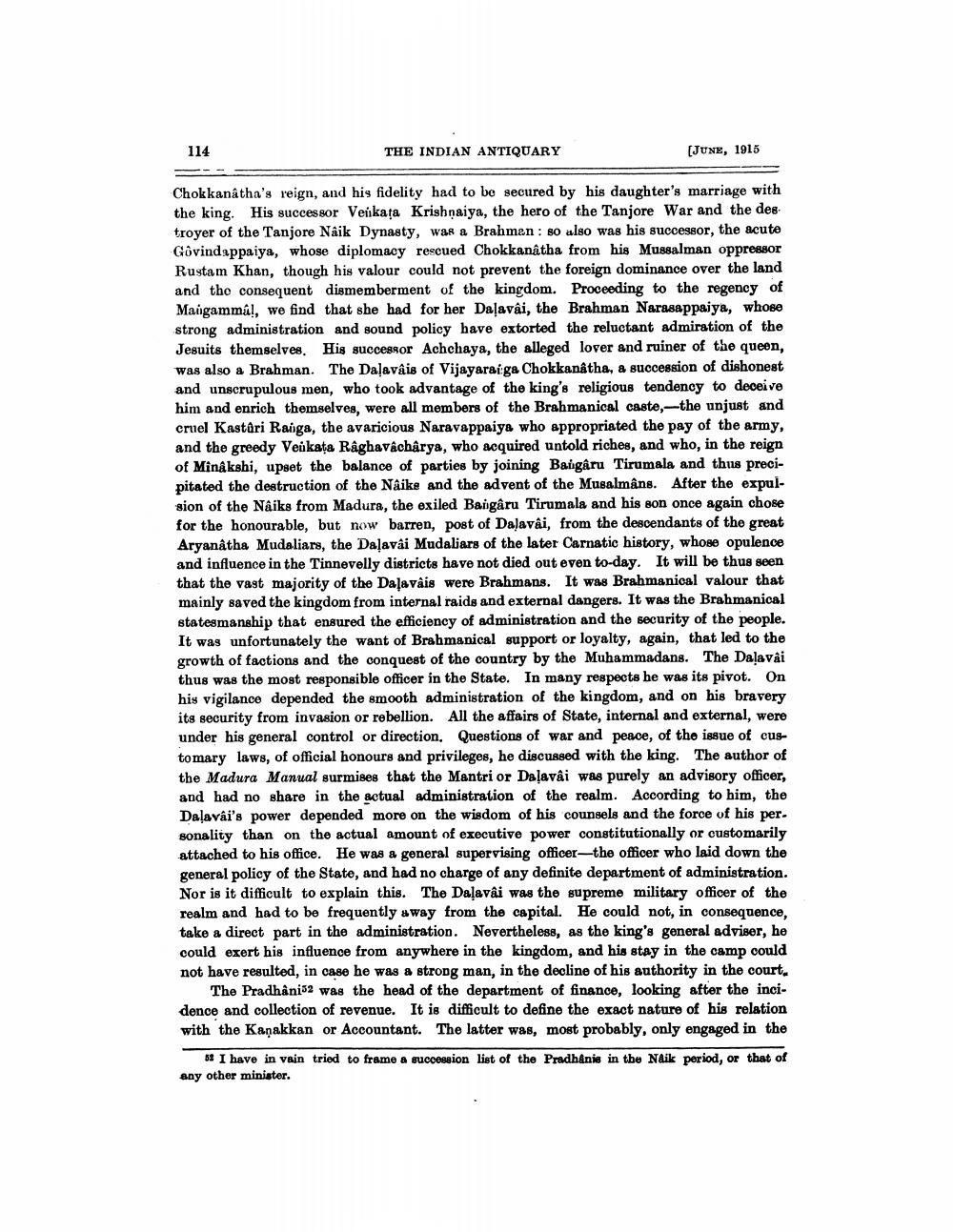________________
114
THE INDIAN ANTIQUARY
(JUNE, 1915
Chokkanatha's reign, and his fidelity had to be secured by his daughter's marriage with the king. His successor Veikata Krishnaiya, the hero of the Tanjore War and the des troyer of the Tanjore Naik Dynasty, was a Brahman : 80 also was his successor, the acute Govindappaiya, whose diplomacy rescued Chokkanatha from his Mussalman oppressor Rustam Khan, though his valour could not prevent the foreign dominance over the land and the consequent dismemberment of the kingdom. Proceeding to the regency of Maugammal, we find that she had for her Dalavai, the Brahman Narasappaiya, whose strong administration and sound policy have extorted the reluctant admiration of the Jesuits themselves. His successor Achchaya, the alleged lover and ruiner of the queen, was also a Brahman. The Daļavâis of Vijayaraiga Chokkanatha, a succession of dishonest and unscrupulous men, who took advantage of the king's religious tendency to deceive him and enrich themselves, were all members of the Brahmanical caste,--the unjust and cruel Kastāri Raiga, the avaricious Naravappaiya who appropriated the pay of the army, and the greedy Veúkata Raghavacharya, who acquired untold riches, and who, in the reign of Minakshi, upset the balance of parties by joining Bangaru Tirumala and thus precipitated the destruction of the Naike and the advent of the Musalmans. After the expulsion of the Naiks from Madura, the exiled Bangâru Tirumala and his son once again chose for the honourable, but now barren, post of Dalavai, from the descendants of the great Aryanatha Mudaliars, the Dalavai Mudaliars of the later Carnatic history, whose opulence and influence in the Tinnevelly districts have not died out even to-day. It will be thus seen that the vast majority of the Dalavais were Brahmans. It was Brahmanioal valour that mainly saved the kingdom from internal raids and external dangers. It was the Brahmanical statesmanship that ensured the efficiency of administration and the security of the people. It was unfortunately the want of Brahmanical support or loyalty, again, that led to the growth of factions and the conquest of the country by the Muhammadans. The Dalavải thus was the most responsible officer in the State. In many respects he was its pivot. On his vigilance depended the smooth administration of the kingdom, and on his bravery its security from invasion or rebellion. All the affairs of State, internal and external, were under his general control or direction. Questions of war and peace, of the issue of customary laws, of official honours and privileges, he discussed with the king. The author of the Madura Manual surmises that the Mantri or Daļavâi was purely an advisory officer, and had no share in the actual administration of the realm. According to him, the Daļavai's power depended more on the wisdom of his counsels and the force of his per. sonality than on the actual amount of executive power constitutionally or customarily attached to his office. He was a general supervising officer—the officer who laid down the general policy of the State, and had no charge of any definite department of administration. Nor is it difficult to explain this. The Dalavai was the supreme military officer of the realm and had to be frequently away from the capital. He could not, in consequence, take a direct part in the administration. Nevertheless, as the king's general adviser, he could exert his influence from anywhere in the kingdom, and his stay in the camp could not have resulted, in case he was a strong man, in the decline of his authority in the court.
The Pradhanis2 was the head of the department of finance, looking after the incidence and collection of revenue. It is difficult to define the exact nature of his relation with the Kaņakkan or Accountant. The latter was, most probably, only engaged in the
03 I have in vain tried to frame a sucoession list of the Pradhania in the Naik period, or that of any other minister.




